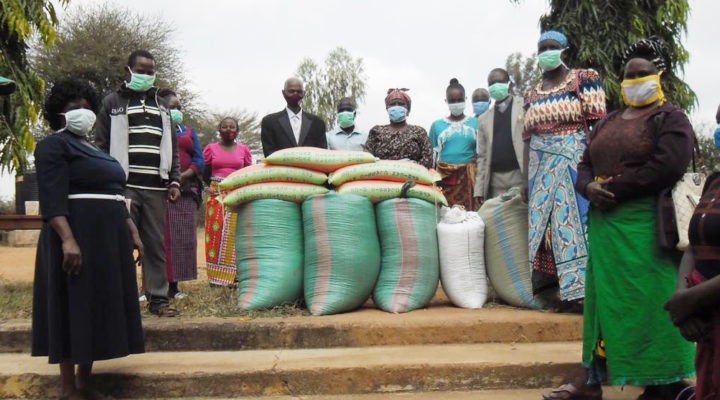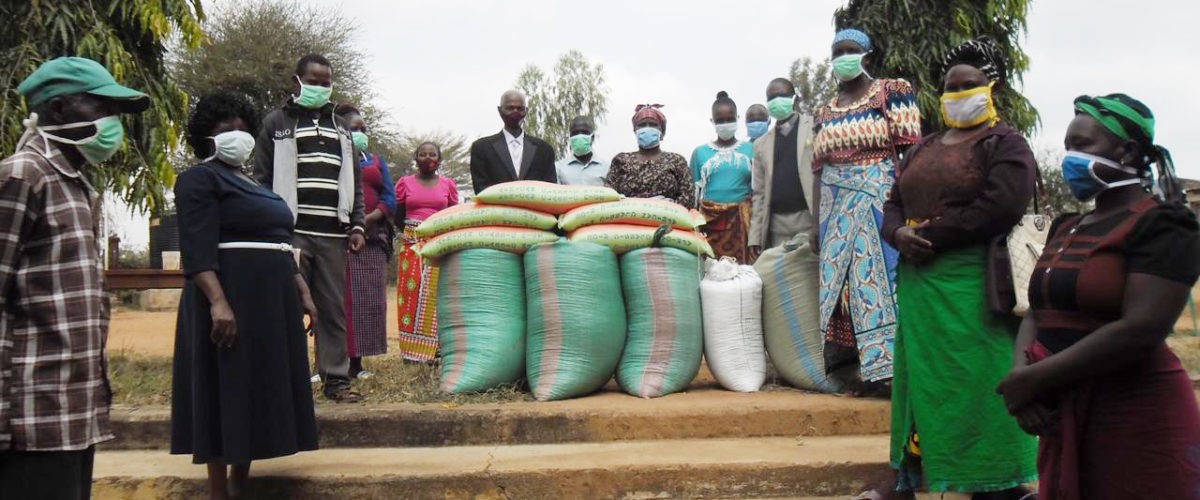U.S-based humanitarian enterprises with long histories of service in Africa are continuing their work despite coronavirus and because of partnerships forged over years of ministry.
Field personnel of the Cooperative Baptist Fellowship, for example, have been restricted in travel since last March but their local partnerships are thriving, according to Sam Harrell, associate coordinator of Global Missions.
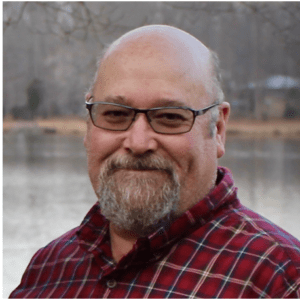
Sam Harrell
“Yes, we were affected. While most of our field personnel stayed in place, preferring not to travel back to the USA in order to be available to continue their ministries, it is fair to say that as with everything everywhere, normal life was suspended,” Harrell reported.
“All volunteer activities were suspended, making us thankful for our long-term ethic and the value we place on local partnerships,” he added. “Our U.S.-based field personnel working with migrants, immigrants and refugees, as well as those working in rural and urban spaces, continued as best they could, given safety constraints.”
With 60 field personnel serving in 19 countries, CBF focuses its work on “bearing witness to Jesus Christ, seeking transformational development and cultivating beloved community” Harrell explained. “The God of creation is concerned about every aspect of our being, including how we treat each other, ‘the least of these’ and all creation. We believe in ministering to the whole person, body and spirit.”
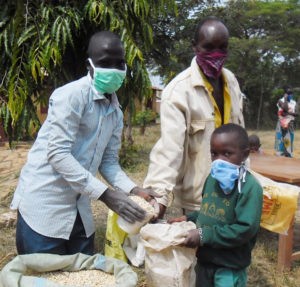
CBF food aid in Kenya
That means seeking to work as partners of equal standing, which has helped in these pandemic days, he continued. “We believe in the value of long-term presence, whether that occurs through long-serving mission personnel who take time to learn language and culture, or through local partners who are rooted in the soil.”
Long before COVID, CBF had focused much its work on community development including education, community health, drilling waters building schools, building solar power, creating self-sustaining gardens, building local capacity and similar “transformational development” projects.
CBF’s primary partner in Kenya is Africa Exchange, which CBF Global Missions founded to carry out its work. This was achieved in cooperation with the churches of the Baptist Convention of Kenya as well as a few Anglican Church of Kenya groups. That on-the-ground presence is not dependent on American volunteers or outsiders restricted by COVID.
Likewise, World Relief — one of the most prominent NGOs serving in Africa — has kept all its work going during the pandemic.
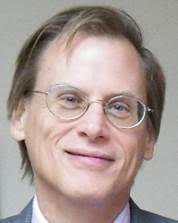
Charles Franzen
Even though the pandemic forced the organization to halt overseas travel since March 13 last year, World Relief has “done a great deal of COVID response work in all countries, especially in the areas of social messaging and clinical health, and in emergency response,” said Charles Franzén, director of humanitarian and disaster response.
“While all our country programs remain fully operational (with additional masking and social distancing requirements, regular testing and quarantining), we also have seen an uptick in food and emergency needs in many of our contexts,” he added. “Our programs and activities have expanded in the past year due to these needs and to the additional pressures brought on by COVID.”
World Relief was founded in 1944 and is visible in African countries like Malawi, Kenya, Burundi, Rwanda, Democratic Republic of Congo, Sudan and South Sudan. Its humanitarian work is rooted in “Christ’s love for all people no matter who they are or where they come from,” Franzén said.
Virtually all the seven countries where its work is most visible have experienced some form of conflict or challenge over the past decades, long before COVID presented new challenges.
“Our programs and activities have expanded in the past year due to these needs and to the additional pressures brought on by COVID.”
World Relief is an active member of the Integral Alliance, an organization comprising 22 evangelical humanitarian and development organizations worldwide, with a mission to provide support for countries impacted by disasters. Although based in Baltimore, World Relief has national offices in each of the seven countries listed above, as well as in Haiti and Cambodia.
Its presence is largest in the DRC, Sudan and South Sudan where it has a combined 700 staff including more than two dozen expatriates providing support in the areas of clinical health and nutrition, food security and livelihoods, water and sanitation, maternal and child health, shelter and protection, education and peace building. Such local presence enables the organization to deploy its resources to “respond powerfully, effectively and quickly” through its partners, Franzén said.
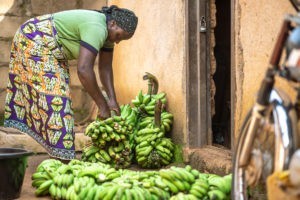
Nvou Gyang tends to her small business selling plantains in Nigeria, supported by World Renew.
As with World Relief and CBF, World Renew has kept serving despite coronavirus.
With offices in Michigan and Ontario, the organization has served in East, West and Southern Africa for about 40 years. COVID has only made the need greater, said Kenneth Kim, director for disaster response>
“There are now more hungry people as a result of the pandemic than before it. World Renew … continues to work supporting our field teams and local partners in communities,” he explained. “Many of our longer-term programs have experienced delays due to restrictions on activities as physical distancing is recommended or ordered in many places. In other communities, our partners must plan to take longer to carry out food distributions to ensure the safety of all those participating from staff to beneficiaries.”
Financially, the effect of the pandemic is greatest on the ground, he added. “While there may be some small savings in international travel costs as all of us are home, the immeasurable cost is high as the pandemic most affects those who are already poor and on the margin than those in wealthier communities who can work remotely from home and have essential goods delivered to their residences. Imagine what it is like for a family in need in a makeshift refugee camp compared to those in a middle0class neighborhood in North America.”
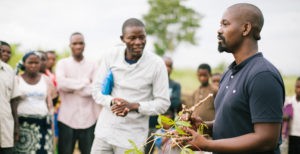
Climate-adaptive farm training with World Renew staff in Mozambique.
And as with CBF and World Relief, World Renew benefits now from its on-the-ground partnerships. It is a founding member of CHS Alliance, a global alliance of humanitarian and development organizations making aid work better for people. Primary interests include food security and nutrition, water sanitation and hygiene, shelter and non-food items and psychosocial support.
World Renew also collaborates with Action by Churches Together Alliance, billed as “the largest coalition of Protestant and Orthodox churches and church-related organizations engaged in humanitarian, development and advocacy work in the world.” The alliance includes more than 130 members working together in 120 countries.
Building community is a key to the mission, Kim said. World Renew “envisions a world where people experience and extend Christ’s compassion and live together in hope as God’s community.”
For some of these faith leaders, commitment to Africa is deeply personal. That’s the case for Franzén, who has worked in Africa more than 40 years. “I am amazed every day by the remarkable people who make up the continent, by their resilience and tenacity, by their incredible humanity and intelligence, and by their deep spirituality,” he said.
Harrell, the CBF leader, is an American citizen who was born in Kenya, where his parents served as missionaries.
“I can proudly say that I am from Africa (Kenya) and that I am more at home there than in the U.S.,” he noted. “Of course, this is the unique privilege of being a child of missionaries.”
“I have found the experience of community in Kenya to be a primary feature of my missionary career.”
He added: “I have found the experience of community in Kenya to be a primary feature of my missionary career. The harambee spirit (“all pulling together”) was the framework of my upbringing. As Western and urban life become more dominant influences on the continent, perhaps that sense of community may decrease; however, I find it is still strong and vital.”
And he concluded: “My Kenyan colleagues are the most generous people on the earth. I believe the future of innovation belongs to Africa with such a relatively young population and an available resource base. Unfortunately, along with that comes unbridled population growth that threatens the precious and unique ecosystems of the continent. I believe poverty is a driver of that growth, and if poverty can be addressed and access to basic education increased, infant mortality will decrease and growth will normalize.”
In other words, after COVID, there’s still plenty of work to do.
Anthony Akaeze is a Nigerian-born religion writer currently living in Houston. He is BNG’s Africa correspondent.

